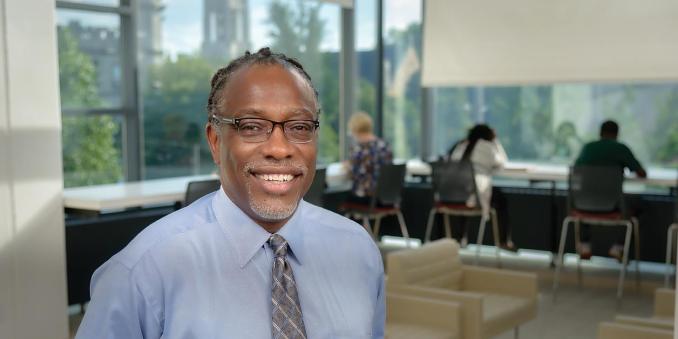A troubling number of older Black Americans are struggling
As the U.S. population ages, older adults face increased economic insecurity. The fallout from the COVID-19 pandemic, escalating inflation and growing economic inequality are eroding the purchasing power of people caught between fixed incomes and rising debt.
Black older adults shoulder an increasingly disproportionate share of this financial strain, a result, in part, of long-standing wealth disparities, said David B. Miller, PhD, an associate professor at the Jack, Joseph and Morton Mandel School of Applied Social Sciences at Case Western Reserve University. Miller, whose research on the issue was published online in Journal of Aging & Social Policy, also collaborated on recent research about disparities in the economic well-being of older Black and white Ohioans led by CWRU colleagues and AARP Ohio.
"It's the sheer level of debt that older adults are taking into retirement that really shocked me," said Miller during a recent interview with Think. "We tried to highlight the gravity of the issue."
What stands out?
The relentless rise in debt among older adults, particularly women of color. Factors such as credit dependency, mortgage obligations post-retirement and a shrinking safety net contribute to an escalating debt burden. Additionally, the growing number of older adults repaying [their] student loans on fixed incomes exacerbates this financial strain.
How did we get here?
There are people who took out loans in the 1960s and 1970s and are still paying off that debt. The housing crisis also played a role. Easy credit and systemic discrimination exacerbate the issue. Many neighborhoods lack financial institutions, leaving the closest options as check-cashing stores and pawn shops with exorbitant interest rates.
What are the possible societal impacts?
As people deal with inflation and higher costs of goods and services, many don't have sufficient retirement savings. Their debt leads to stress, which results in significantly poorer health outcomes.
How do health disparities factor in?
African American older adults face nearly triple the medical debt of white peers, with worsening financial and health disparities due to income gaps, insurance issues and systemic discrimination within and from educational, financial, healthcare or other social institutions. This leads to neglected health needs and stress-related conditions.
Aren't their medical bills paid by Medicare?
Those entering the program may carry medical debt with them that was accrued. That's not uncommon.
What needs to be done?
I hope this research prompts policymakers to prioritize initiatives aimed at addressing the root causes of financial fragility among Black older adults. This includes implementing equitable economic policies, strengthening social safety nets, addressing massive student-loan debt and enhancing access to financial education and resources.
We need guardrails to protect older adults from scams and provide financial literacy at an earlier age.
Another part of this is to say to social workers and others who work with older adults, 'Let's not wait until this bubble pops.' We need to do something about this now.
The Economic Vulnerability of Older Black Ohioans
CWRU researchers* led a recent study with AARP Ohio exposing sizable gaps between the financial health of Black older Ohioans and their white counterparts, likely the result of generations-long inequities. The study found, for example, that compared to their white counterparts, Black older Ohioans are:
Three times more likely to report "finding it difficult to get by."
Three times more likely to report not having enough to eat sometimes or even often in the last 12 months.
More than twice as likely to have borrowed money or cashed-out money from retirement savings plans.
*Research Associate Professor Francisca García-Cobián Richter, PhD, and Professor Daniel Shoag, PhD, led the study, analyzing federal data focused on individuals at least 50 years old and conducting group discussions.
— COLIN MCEWEN (LAW '23)
This story appeared in the fall/winter 2024 issue of Think magazine.



